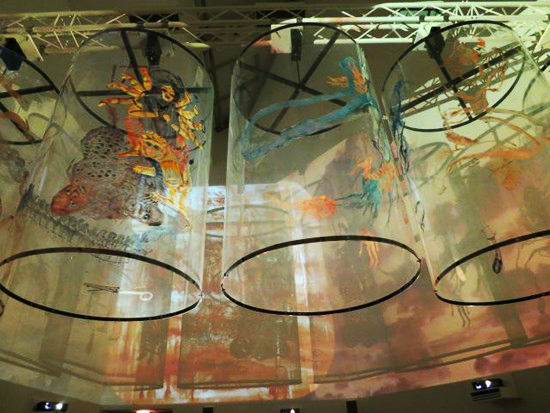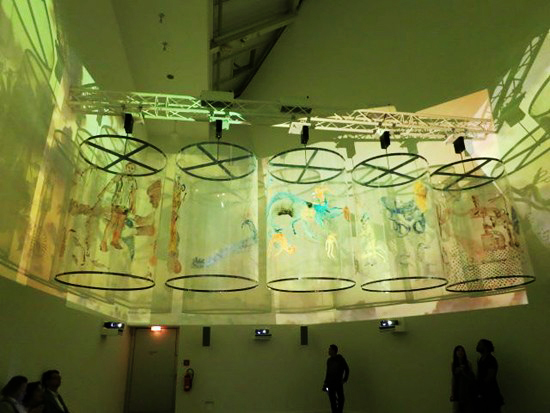 Nalini Malani. Courtesy Inamori Foundation.
Nalini Malani. Courtesy Inamori Foundation.
On June 16, the Inamori Foundation announced the laureates of this year’s Kyoto Prize, an international award presented to individuals who have contributed significantly to the scientific, cultural, and spiritual betterment of humankind. In Art and Philosophy, the 2023 Kyoto Prize laureate is Nalini Malani, an artist who has faced the predicaments of the oppressed, pioneered artistic expression representing the voice of the voiceless, and contributed to the decentralization of art from the Global South.
Mumbai-based artist Nalini Malani (born 1946, Karachi, British India) has been engaging with universal themes such as religion, war, gender, and the environment while confronting the modern and contemporary history of the Indian subcontinent. Dealing with the oppression suffered by specific individuals—including women and the poor, Malani creates works in which the oppressors, the oppressed, the goddesses who govern the changing world, and various animals come together, spinning around and casting shadows on the exhibition walls. Like a scene from a mythological play staged at a regional festival, her work evokes the voices of the voiceless buried in today’s society. Her exceptional ability to draw motifs, the beauty of the spaces that immerse the viewer, the universal themes of conflict, reconciliation, oppression, dreams, and myths throughout her work have all been instrumental in current moves toward the rethinking of Western-centrism in art.
Following the announcement, Malani commented, “For all my life I have felt as an artist I must contribute to the advancement of society and humankind. It is my strongest belief that our future in the turbulent waves of the twenty-first century urgently needs a greater cognizance of the feminine side of thought. The importance to connect the emotional, the social, and the technological components together in a balanced play is needed more than ever. I am very humbled and profoundly honored to have my art to be considered worthy of this year’s Kyoto Prize. I am deeply grateful to the Inamori Foundation.”
 Nalini Malani, In Search of Vanished Blood (2012) dOCUMENTA (13), Kassel, 2012. Photo: ART iT
Nalini Malani, In Search of Vanished Blood (2012) dOCUMENTA (13), Kassel, 2012. Photo: ART iT
 Nalini Malani, In Search of Vanished Blood (2012) dOCUMENTA (13), Kassel, 2012. Photo: ART iT
Nalini Malani, In Search of Vanished Blood (2012) dOCUMENTA (13), Kassel, 2012. Photo: ART iT
Born in Karachi, then in the British Indian Empire, Malani fled to India as a refugee shortly after the Partition of India and Pakistan in 1947 and later studied painting in Bombay (now Mumbai). After spending several years in Paris in the early 1970s, Malani later returned to India where she organized the traveling exhibition “Through the Looking Glass” (1987-89), the first exhibition in India devoted solely to female Indian artists. In the 2000s, Malani established a style for which she is now famous, taking motifs of deities from traditional mythology and using new technologies such as video and projection to create phantasmagorical spaces reminiscent of shadow plays and revolving lanterns.
In 2002, Malani staged her first international solo exhibition “Hamletmachine” at the New Museum, New York. She has since participated in international group exhibitions including the 52nd Venice Biennale (2007), dOCUMENTA (13) (2012), and many more. She has had works shown in major exhibitions including the three-part retrospective “You Can’t Keep Acid in a Paper Bag (1969–2014)” (2014) at the Kiran Nadar Museum of Art, New Delhi, “The Rebellion of the Dead: Retrospective 1969–2018” (2017–2018) at the Centre Pompidou, Paris, and the Castello di Rivoli, Turin, and “Visions in Motion” (2021–2022) at M+, Hong Kong. In Japan, she has participated in group exhibitions including “A Perspective on Contemporary Art: Emotional Drawing” at the National Museum of Modern Art, Kyoto, and the National Museum of Modern Art, Tokyo (2008), “Artist File 2013” (2013) at the National Art Center, Tokyo, “Women In-Between: Asian Women Artists 1984–2012” (2012– 2013) which traveled to Fukuoka Asian Art Museum, Tochigi Prefectural Museum of Fine Arts, and two other venues. In 2013, she was the recipient of the 24th Fukuoka Prize for Arts and Culture.
 Nalini Malani, In Search of Vanished Blood (2014) Shanghai Biennale, 2018. Photo: ART iT
Nalini Malani, In Search of Vanished Blood (2014) Shanghai Biennale, 2018. Photo: ART iT
Other laureates include reproductive biologist Ryuzo Yanagimachi, D.Sc., Professor Emeritus, University of Hawaiʻi at Mānoa, who was awarded in the fields of Biotechnology and Medical Technology under the Advanced Technology category for his contributions to the elucidation of fertilization mechanisms and the establishment of microinsemination technology. In the Mathematical Sciences (including Pure Mathematics) field under the Basic Sciences category, mathematician and physicist Elliott H. Lieb, Ph.D., professor of mathematics and Higgins Professor of Physics emeritus, Princeton University, was awarded for his pioneering mathematical research in physics, chemistry, and quantum information science based on many-body physics. Each laureate will receive a diploma, the Kyoto Prize medal (20k gold), and a monetary award of 100 million yen (approximately 700,000 USD). The Kyoto Prize presentation ceremony will be held on November 10 at the Kyoto International Conference Center. The three laureates will deliver commemorative lectures the following day at the same location. The annual symposium and public lectures are scheduled to be held in San Diego, California, in March 2024, and Oxford, UK, in May 2024
Kyoto Prize:https://www.kyotoprize.org/en/
Inamori Foundation:https://www.inamori-f.or.jp/en/
